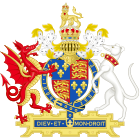Act Respecting the Oath to the Succession facts for kids

|
|
| Citation | 26 Hen. 8. c. 2 |
|---|---|
| Territorial extent | Kingdom of England |
| Dates | |
| Royal assent | November 1534 |
| Repealed | June 1536 |
| Other legislation | |
| Repealed by | Succession to the Crown Act 1536 |
| Relates to | |
|
Status: Repealed
|
|
| Text of statute as originally enacted | |
The Act Respecting the Oath to the Succession was a law passed in November 1534 by the Parliament of England. This law, also known as the Succession to the Crown Act 1534, made it a rule for everyone in England to take an oath. An oath is a serious promise. This promise was to support an earlier law called the Act of Succession, which had been passed in March of the same year.
What Did the Act Do?
This important law made people promise to accept Anne Boleyn as King Henry VIII's true wife. It also meant they had to agree that any children born to King Henry and Anne would be the rightful heirs to the throne. If someone refused to take this oath, they were seen as going against the king.
Why Was the Oath Important?
The oath was more than just a simple promise. It also asked people to reject the power of any "foreign authority." This mainly meant rejecting the power of the pope, who was the leader of the Catholic Church. It also meant people had to cancel any promises they had made to such an authority before.
This extra part of the oath caused problems for some people. For example, Sir Thomas More, a famous scholar, refused to take the oath. He felt that the oath included things that were not in the original law. He believed that Thomas Cromwell and Thomas Audley had added these extra words. Because of his refusal, Sir Thomas More was sent to the Tower.
Consequences of Refusal
Refusing to take the oath had very serious consequences. Sir Thomas More, Bishop John Fisher, and John Houghton were all arrested. They were devout Catholics and believed that King Henry VIII's marriage to Catherine of Aragon was still valid. They also believed in the authority of the pope. Because they refused to reject their Catholic beliefs and the pope's authority, they were sadly executed in 1535.
See also
 | John T. Biggers |
 | Thomas Blackshear |
 | Mark Bradford |
 | Beverly Buchanan |

